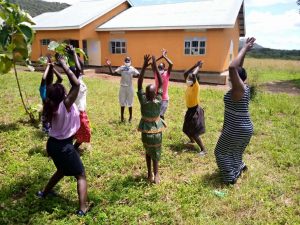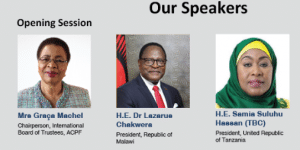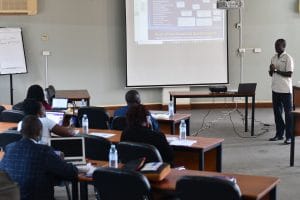
Timothy Opobo, Executive Director, AfriChild has invited child-focused researchers to collaborate with AfriChild to conduct a secondary analysis of VACs data. Timothy made the call during training of in-country researchers on VACs data analysis.
“Join us to illuminate the drivers and protective factors for sexual violence against children in Uganda so that we can use research to inform specific and targeted interventions both at national and sub-national levels,” Timothy said.
The AfriChild Centre runs a Research Fellowship with Together For Girls that focuses on strengthening individual and institutional in-country research capacity to generate and utilize evidence for policy and programming for prevention and improved response to violence against children.
In April, AfriChild conducted a three-day training for in-country researchers and institutions in the secondary analysis of VACs data. The training is one of the efforts to scale up knowledge and skills among researchers on VACs data analysis in Uganda.
The training took place at Makerere University, Senate Building and brought together child-focused researchers from 6 universities; Kyambogo, Makerere, Gulu, Uganda Christian, Uganda Martyrs, and Nsamizi Institute of Social Development. The participants were selected from the first cohort of AfriChild’s Inter-University Child Focused Research Methods training Programme.
Speaking during the opening of the training, Clare Bangirana, Director Research, and Knowledge Development, AfriChild, applauded participants for picking interest in secondary data analysis.
“Several data sets exist within ministries and different organizations which need further analysis to inform policy and programming,” Clare said.
Training in-country researchers
Agatha Kafuko, a research fellow facilitated the training supported by three AfriChild staff, Clare Bangirana, Mathew Amollo, and Maria Ndibalekera all beneficiaries of the fellowship.
Over the three days, workshop participants reviewed the Uganda Violence Against Children Study findings, secondary data analysis, formulation of research questions, and use of STATA, a data analysis tool.
The National Violence Against Children survey is a worldwide study done in specific countries to explore and generate new information on violence against children in particular countries. It is a purely quantitative household study that targets children between 13- 17 and young adults aged 18 to 24 years. It captures data on current exposure of VAC and consequences of lifetime exposure of VAC.
Various VACS studies have been conducted in different African countries including Kenya, Malawi, Tanzania among others. Some countries like Kenya are having their second survey while Uganda is planning to hold its second VACs.
The Uganda VACs study was commissioned by the Ministry of Gender, Labour and Social Development (MGLSD) with support from other agencies such as CDC, UNICEF, ChildFund International, AfriChild, TPO, Makerere School of public health, and other partners.
About the research fellowship
Together for girls is a global organization focused on ending violence against children. In this effort to end violence against Children, Together for Girls Partnered with AfriChild to undertake a research fellowship to conduct further analysis of the VACS data and develop publications from the research to be used to inform policy and programming in child protection.
At the start of the project, AfriChild recruited two Research Fellows to lead the process supported by 3 AfriChild staff. They underwent a series of training conducted virtually by Together For Girls and The Centre for Disease Control (CDC) between September and December 2020.
The Research Fellows are expected to train others researchers and build their skills in VACs data analysis. This is to help scale up the skill base among child-focused researchers in the country.
Mathew Amollo, Research Manager, AfriChild, and a beneficiary of the research fellowship, trained participants on secondary data analysis using STATA software.
He also trained participants on how to formulate research questions derived from the VACs data. They reviewed the VACs questionnaires specifically the household head questionnaire, female and male questionnaire. The researchers appreciated the process of question formulation and the richness of the VACs data set.






